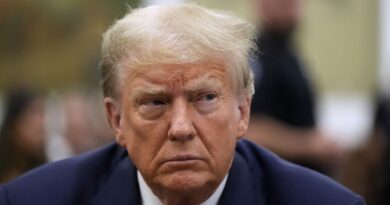Conspiracy Memo called for seizure of NSA data to overturn election: WaPo

- An election conspiracy memo called for the seizure of NSA data to overturn the 2020 election.
- The memo, obtained by the Post, said the data could be examined for evidence of interference.
- The memo was also sent to offices of GOP senators pitched on outlandish election conspiracies.
Conspiracy theorists pitched Trump allies and GOP senators on a plan for former President Donald Trump to use his executive authority to seize raw data from the NSA to help overturn the 2020 election, the Washington Post reports.
The December 18 memo, written by former congressional candidate and Trump campaign surrogate Michael Del Rosso, wound its way through Trumpworld and was sent to some Republican members of Congress as part of wide-ranging efforts by conspiracy theorists to overturn Trump’s 2020 election loss.
The NSA has a powerful data-collection and surveillance apparatus that allows it to intercept large quantities of raw phone, text, email, and social media data and share that raw data with other federal agencies.
The memo called for the president to seize that raw data under National Presidential Memorandum-13, which authorizes certain offensive cybersecurity operations, and examine it for evidence of possible foreign interference in the 2020 election. The US intelligence community concluded that no foreign adversary “attempted” to hack voting machines or alter any data to change the outcome of the election.
“Those targeted inquiries will likely identify hard evidence of foreign involvement in DOD data which will support all other efforts to reverse the fraud,” the memo said.
The memo added the “inquiry would be done confidentially and could be completed in several days,” saying, “to treat this solely as a legal issue is to ensure that the USG’s response is under-scoped and inadequate.”
The memo called for then-Defense Secretary Christopher Miller to appoint Del Rosso, retired military lawyer Frank Colon, and a former National Security Council official to examine the NSA communications.
Miller and Colon, for their parts, both told the Post they had not been made aware of the memo or its contents. It’s also unclear whether the memo made it to Trump himself, or if he was aware of the proposal.
Michael Daniel, a top cybersecurity official under the Obama administration, told the Post the memo was “a crazy tangle of things” that misunderstood the president’s executive authority over cybersecurity matters.
“To use an overused term, all of this would have been completely unprecedented. I can’t imagine anything like that ever having happened before,” he told the Post. “It would have been a radical departure from normal procedure.”
The memo was also sent to the offices of Republican senators that figures including MyPillow CEO Mike Lindell, lawyer Sidney Powell, and former Overstock.com CEO convened at the Trump Hotel on January 4 in a previously-unreported meeting.
They pitched Sen. Ron Johnson of Wisconsin, Sen. Kevin Cramer of North Dakota, and Sen. Cynthia Lummis of Wyoming on wild conspiracy theories that they hoped would convince them to object to election results at the January 6 joint session of Congress and delay Biden’s presidency.
The presentation included, among other things, unfounded conspiracy theories claiming that China and Venezuela had hacked voting machines.
“We were hoping that the senators would give it 10 more days to give it back to the states,” Lindell told the Post, referencing a misguided idea that already-certified slates of presidential electors could be “sent back” to the states for review.
Cramer told the Post the presentation contained “lot of theories but not a lot of evidence.”
“The whole point was getting a message to the president and the vice president on what they should be doing to stop the certification, the North Dakota senator said, adding, “Honestly, I was not impressed by these people.”
Both Cramer and Johnson ended up voting to affirm Biden’s election victory on January 6, while Lummis voted to object to counting Pennsylvania’s slate of electors for Biden.
Michael Pillsbury, an “informal” Trump adviser, described the chaotic period leading up to January 6 as “amateur hour” to the Post, including “people who did not know Trump or had never met with Trump before in their lives attempting to get into the Oval Office to get authorized to do investigations that the rest of the government had examined and had said there was no evidence for.”
Emails obtained in previous congressional investigations and reporting showed that former White House chief of staff Mark Meadows pushed baseless conspiracy theories that Italy had used military satellites to hack voting machines and that China hacked into voting machines with thermostats, which he and former DOJ official Jeffrey Clark pitched to the highest levels of DOJ leadership.
The new revelations about the memo advocating for the seizure of NSA data adds to other recent reports revealing that Trump was directly involved in another ultimately unsuccessful plan to have the Department of Homeland security seize voting machines and examine them for evidence of fraud or hacking.
Earlier this year, Politico published the full text of a previously-reported December 2020 draft executive order that laid out a plan for Trump to order the federal government to seize voting machines and appoint a special counsel to investigate voter fraud, a post that Powell reportedly wanted.
*** This article has been archived for your research. The original version from Business Insider can be found here ***


